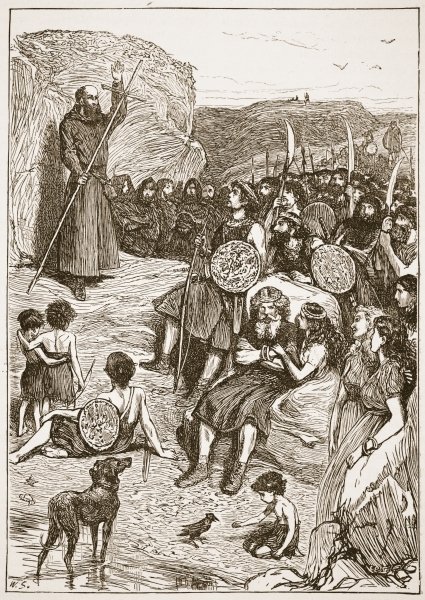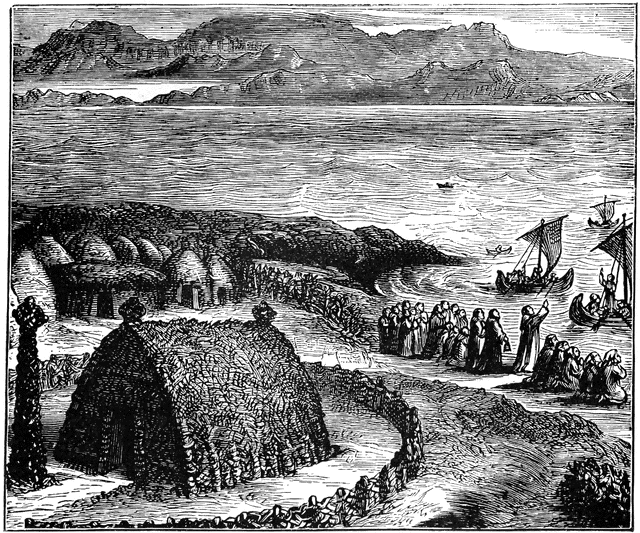Some thoughts on the Mission of the
Holy Celtic Church ....... Rt Revd Dom Alistair Bate OSBA
Traditionally the churches takes their impetus to mission from the Gospel verse “Go ye therefore, and teach all nations, baptizing them in the name of the Father, and of the Son, and of the Holy Ghost:” and it is fair to assume that this applies to all churches. Perhaps indeed members of mainstream denominations might look at some of us in the Independent movement and accuse us of a lack of interest in this apparently essential aspect of Christianity. However, it may be useful to unpack and explore that basic assumption.
The world has seen two millenia of Christian expansion from its homeland in the Middle East, to Europe, the New World and now throughout the globe, making it the biggest and most successful religion by a long way. Perhaps more importantly, Christian ethics spear-headed and informed the development of humanism and our western liberal humanistic values, laws and lifestyle which are so precious to us all. Perhaps too, this is a fact that many secular humanists forget, which is hardly suprising as the majority of mainstream churches; Roman Catholics, Orthodox and Evangelical now appear to be a retrograde force fighting against human rights rather than for them. I will resist at this point cataloguing their short-comings, but some of the inhuman, unwise and counter-cultural policies of these churches should be apparent to any liberal reader of this article.
Europe, the heartland of Christendom, is now largely faithless, and the rest of the developed world is not far behind. In fact it may not be an exageration to say that Christianity, in the "west" or "global north", appears to be a spent force. Among the few Catholic priests left it becomes more and more common to see faces from the developing world, which is the churches’ new heartland, but these priests mainly minister to the elderly and it is almost certain that there will be little call for their services within a couple of decades at most. Attempting to teach the younger generations of educated Europeans from within institutional Christianity is an utter waste of time, if what one is doing is merely affirming the necessity for intellectual assent to an unlikely set of propositions. The German liberal theologians of the 19th and 20th centuries recognised the need for a rational interpretation of Christianity and the late twentieth century has also seen the popularity of honest-to-God theologians like John Robinson, John Spong, Marcus Borg, Lloyd Geering and Richard Holloway. Marvellous. They did a great job of dismantling the superstition from the essential, however, what is left is often a valley of dry bones, with little more appeal to the spiritually dormant than the dogmatic certitudes the theologians so elegantly dismantled. Their kind of liberal theology is rather like nouvelle cuisine. It looks quite appetising and tastes quite nice but it leaves you unsatisfied and hungry for something more!
The “New Age", likewise, a sign of hope for some kind of spirituality, gathered momentum from the 70s but these days it doesn’t really appear to be going anywhere very fast. Neo-paganism, on the other hand, though a comparitively small new religious movement is perhaps a little more healthy, partly due no doubt to the pressing need for a spirituality that is ecologically responsible and motivated.
The world has seen two millenia of Christian expansion from its homeland in the Middle East, to Europe, the New World and now throughout the globe, making it the biggest and most successful religion by a long way. Perhaps more importantly, Christian ethics spear-headed and informed the development of humanism and our western liberal humanistic values, laws and lifestyle which are so precious to us all. Perhaps too, this is a fact that many secular humanists forget, which is hardly suprising as the majority of mainstream churches; Roman Catholics, Orthodox and Evangelical now appear to be a retrograde force fighting against human rights rather than for them. I will resist at this point cataloguing their short-comings, but some of the inhuman, unwise and counter-cultural policies of these churches should be apparent to any liberal reader of this article.
Europe, the heartland of Christendom, is now largely faithless, and the rest of the developed world is not far behind. In fact it may not be an exageration to say that Christianity, in the "west" or "global north", appears to be a spent force. Among the few Catholic priests left it becomes more and more common to see faces from the developing world, which is the churches’ new heartland, but these priests mainly minister to the elderly and it is almost certain that there will be little call for their services within a couple of decades at most. Attempting to teach the younger generations of educated Europeans from within institutional Christianity is an utter waste of time, if what one is doing is merely affirming the necessity for intellectual assent to an unlikely set of propositions. The German liberal theologians of the 19th and 20th centuries recognised the need for a rational interpretation of Christianity and the late twentieth century has also seen the popularity of honest-to-God theologians like John Robinson, John Spong, Marcus Borg, Lloyd Geering and Richard Holloway. Marvellous. They did a great job of dismantling the superstition from the essential, however, what is left is often a valley of dry bones, with little more appeal to the spiritually dormant than the dogmatic certitudes the theologians so elegantly dismantled. Their kind of liberal theology is rather like nouvelle cuisine. It looks quite appetising and tastes quite nice but it leaves you unsatisfied and hungry for something more!
The “New Age", likewise, a sign of hope for some kind of spirituality, gathered momentum from the 70s but these days it doesn’t really appear to be going anywhere very fast. Neo-paganism, on the other hand, though a comparitively small new religious movement is perhaps a little more healthy, partly due no doubt to the pressing need for a spirituality that is ecologically responsible and motivated.
We in the Holy Celtic Church and kindred churches fill a unique niche in endeavouring to combine rational interpretation of the tradition with a strong orientation towards personal mysticism, however, our occupation of this niche does not necessarily mean that we will have any role to play in any possible resurgence of Christianity, in fact I can’t help feeling that the opposite is more likely. Undoubtedly we shall be considered as passé and irrelevant as all the other churches, despite the treasures we would wish to share with the masses. Never was the proverb more true, “You can lead a horse to water but you can’t make it drink.” All we can do is be faithful to our own calling and hope that God will bring to harvest whatever seeds we manage to plant.
During the second half of the 20th century the response of Rome and Canterbury to a changing world and the incoming tide of secularisation was to try and modernise, which meant in fact that the the liturgy was butchered, teaching reduced to a few mild moral exhortations and all sense of mystery erased. Certainly great improvements have also been made in recent decades in that the churches are more hospitable and less dysfunctional on a human level, but whether they can serve spiritual food above the level of microwave dinners is very debatable. Many of the religious/monastic communities can and do, but the majority of people do not feel able to access this tradition for one reason or another, hence the comparitive success of “New Monasticism”, an attempt to participate in monastic spirituality without theunnecessarily hard labour.
So, given the state of Christianity in the developed world, what of our specific mission as the Holy Celtic Church?
Here are a few points for your consideration.
Our mission is:
In short, let us aim for quality rather than quantity. Our own faith must be profound and rooted in daily spiritual practice. Then hopefully having fanned the spark of Divine potential into at least a little flame we can pass it on to other awakened souls who may be looking for that something more.
It should be clear that as universalists we feel no compulsion to convert and we are clear that our religion is not about giving people pie-in-the-sky when they die, but is rather about the enrichment and re-enchantment of individual lives here and now. Hopefully what we have to offer may have wider appeal than we can now anticipate. To God be the glory!
During the second half of the 20th century the response of Rome and Canterbury to a changing world and the incoming tide of secularisation was to try and modernise, which meant in fact that the the liturgy was butchered, teaching reduced to a few mild moral exhortations and all sense of mystery erased. Certainly great improvements have also been made in recent decades in that the churches are more hospitable and less dysfunctional on a human level, but whether they can serve spiritual food above the level of microwave dinners is very debatable. Many of the religious/monastic communities can and do, but the majority of people do not feel able to access this tradition for one reason or another, hence the comparitive success of “New Monasticism”, an attempt to participate in monastic spirituality without theunnecessarily hard labour.
So, given the state of Christianity in the developed world, what of our specific mission as the Holy Celtic Church?
Here are a few points for your consideration.
Our mission is:
- To preserve, maintain and pass on intact the Liberal Catholic liturgical tradition, the liturgy itself being the vehicle by which a great wealth of good theology and spirituality may be communicated.
- To present a Celtic Church community which is at once true to the basic sacramental structure of the original Celtic churches but more theologically open and insightful, as well as, better adapted to the amenities of modernity.
- To interpret the Catholic faith along esoteric/mystical lines - the methodology modelled by our founding Fathers (+Wedgwood, +Leadbeater, +Tugdual) to be adapted to our own Celtic spirituality and the changed circumstances of our times.
- To enable individuals to pursue an initiatic path of spiritual development, through reception of the mysteries of Baptism and Confirmation and the other sacraments as may be appropriate. Among us the call to the sacrament of Holy Orders is not necessarily linked to formal pastoral ministry but rather its primary purpose is the spiritual development of the individual. Any active ministry flowing from this is desirable and a blessing, but by no means absolutely necessary.
- To encourage vocations to the Holy Cross Benedictines of Adoration and the Holy Celtic Order of the Temple, both initiatic paths designed to lead individuals into deeper contempation of the mysteries and ultimately into the experience of Divine Union.
- To create spaces for contemplation and spiritual development, through Eucharistic Adoration, the celebration of the Sacraments and Divine Office as well as extra-liturgical ceremonies and to make these spaces available to those people led within our orbit.
In short, let us aim for quality rather than quantity. Our own faith must be profound and rooted in daily spiritual practice. Then hopefully having fanned the spark of Divine potential into at least a little flame we can pass it on to other awakened souls who may be looking for that something more.
It should be clear that as universalists we feel no compulsion to convert and we are clear that our religion is not about giving people pie-in-the-sky when they die, but is rather about the enrichment and re-enchantment of individual lives here and now. Hopefully what we have to offer may have wider appeal than we can now anticipate. To God be the glory!


 RSS Feed
RSS Feed
